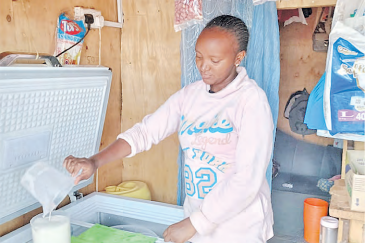

Esther Wanjiku is a milk vendor in Kangemi, Nairobi County.
“We used to warn each other whenever the officers came around. I would either close my milk kiosk and hide, or leave it open and run off,” she says.
But today, she confidently interacts with the regulators whenever they come for inspection.
“I’m no longer afraid. Now, I can answer their questions and address their concerns because I genuinely want to improve my business. The training has given confidence and positively impacted my operations. I’ve learned valuable skills that I apply daily,” the 27-year-old says.
Growing up in a dairy farming family in Kiambu county, Wanjiku’s passion for the milk business came naturally.
“When I started my business, I felt it was the right path for me. I come from a dairy farming family, and it has always been a source of income for us. I used to help my parents with milking, and it wasn’t just a chore but something I enjoyed.”
After completing her college education in hotel and catering in 2017, Wanjiku struggled to secure a job, so she turned to side hustles.
After saving up, she bought a milk vending business from a relative in 2023. Initially, she focused more on quantity than quality. She sources her milk from trusted suppliers.
“At first, I trusted my suppliers and didn’t question the quality of the milk they provided. Even when customers complained, I’d attribute the issue to improper handling or unclean milk containers.”
However, after undergoing training through the More Milk project, Wanjiku learned that she needed to take charge of ensuring the milk’s quality herself.
This shift has significantly improved her business. She is now also focused on providing excellent customer service.
On a typical day, Wanjiku sells between 70 and 80 litres of milk at Sh70 per litre.
More Milk for Lives and Livelihoods in Kenya Initiative is a collaboration led by the Kenya Dairy Board and the International Livestock Research Institute, with the goal of enhancing milk safety, regulatory compliance, and market access for small-scale dairy businesses.
The four-year project is funded by the Bill & Melinda Gates Foundation and the UK Foreign, Commonwealth and Development Office.
It will be implemented in Nakuru, Nyandarua, and Uasin Gishu counties. Kenya Dairy Board managing director Margaret Kibogy explained that More Milk plays a crucial role in supporting KDB’s mandate of ensuring milk safety and quality.
This includes overseeing primary production, transportation, and processing along the value chain.
She pointed out the importance of training vendors in the informal dairy sector, which is significant in Kenya.
“We will be training them and building their capacity to ensure that the milk they sell to consumers is safe and suitable for consumption,” Kibogy stated during the launch of the More Milk 2 initiative at ILRI’s headquarters in Nairobi.
The initiative also seeks to formalise the informal sector, with a target of increasing the proportion of milk handled through formal businesses from 30 per cent to 50 per cent over the next five years.
“The More Milk initiative will contribute to achieving national developmental goals and aligning with the bottom-up transformational agenda.”
Vendors, who play a critical role in achieving this goal, are increasingly adopting new technologies and transforming along the value chain to ensure consumers receive safe and healthy milk.
“Historically, 60 per cent of the dairy sector has been informal, but there has been positive movement toward formalization. To further this process, we need to invest in training because informal vendors play an important role in livelihoods, job creation, food security, and nutrition, especially at the lower end of the pyramid,” Kibogy said.
She highlighted the growth in Kenya’s milk production and processing capacity, with the country’s production rising from 800 million litres to approximately one billion annually. Currently, 85 per cent of this is processed.
“We are now focused on expanding high-value products like cheese and butter for export. Our export value has grown from Sh4.5 billion to Sh9.3 billion last year,” Kibogy said.
“This signals strong potential for growth in the dairy sector and opportunities in the export market.”
Kenya exports flavoured milk to Somalia and yogurt to South Sudan. Kibogy said KDB is developing an export strategy and identifying key markets.
Kibogy said the Ministry of Trade,
has been engaging potential markets
in the Middle East, where there is
interest in Kenyan products like ghee
and butter.






